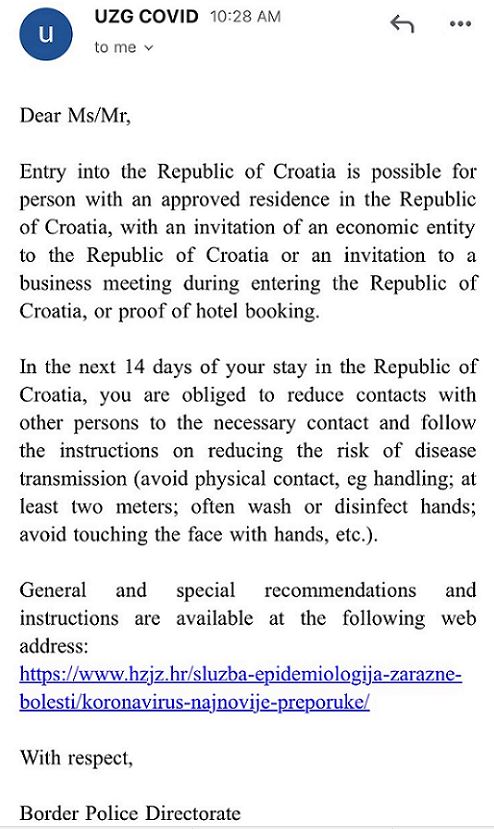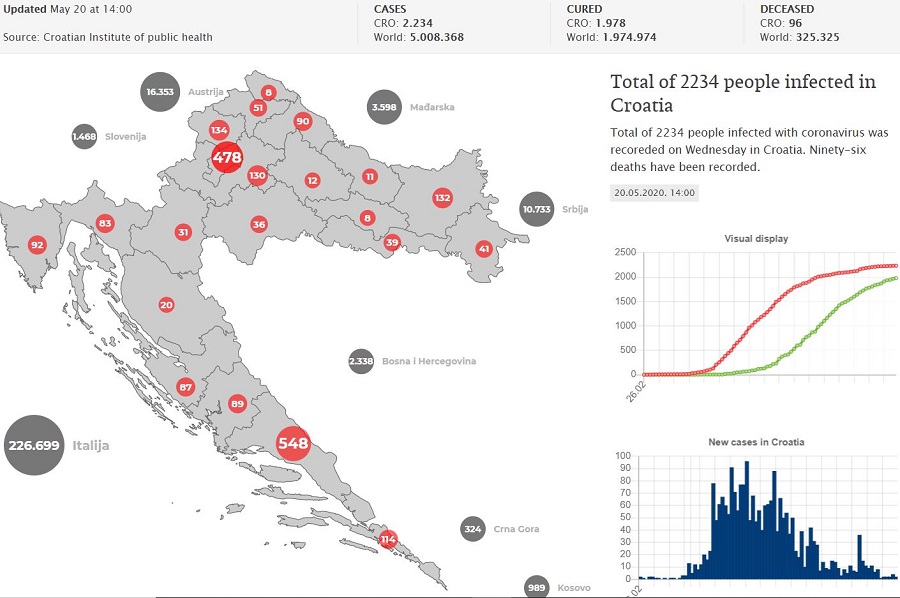Ministry of the Interior Responds to Croatian Travel Questions
May 21, 2020 - TCN recently sent MUP (the Ministry of the Interior) a set of questions regarding the current coronavirus-induced circumstances in which we all find ourselves, as well as a few other things. Here are those questions and MUP's response in full:
1. Who can enter Croatia at the moment?
Croatian citizens are allowed to enter the Republic of Croatia, while dual citizens at the Croatian border are treated as Croatian citizens and should be identified as such at the border crossing.
The amended Decision on the temporary ban on crossing the border crossings of the Republic of Croatia allows foreign citizens to enter the Republic of Croatia in the case of:
- business reasons or other economic interest for the Republic of Croatia,
- urgent personal reasons.
2. New measures have been announced which state that people can come if they have a holiday home here, hold legal residence, or if they have some economic reasons for entering. This is all a bit vague. Can you explain exactly what the new rules are and when they come into effect?
In the case of a business visit, EU/EEA citizens must present documentation at the Croatian border showing their economic interest in the Republic of Croatia or proof of the economic operator's interest in that person entering, or an invitation to a business meeting. This category also includes proof of paid accommodation or the reservation of an apartment/hotel, a contract on the lease of space in a camp, the reservation of a plot in a camp, the rent of a tourist boat or sailboat, paid or previously agreed tourist tours of the Republic of Croatia and other things which fall onto the spectrum of tourist activities, the co-ownership shares in companies registered in the Republic of Croatia, visits to dental clinics, etc.
In the case of urgent personal reasons, foreign citizens must have documentation proving the possession of property located in the Republic of Croatia, or the ownership of a vessel, documentation from which it is evident that the arrival is for the purpose of burying/attending the funeral of a family member. Under this category, a possible reason may be the the care of family members, especially those who are older, coming to participate in court hearings or taking the state exam, coming to financial institutions if foreigners receive a salary or pension from a Croatian employer, the wedding of a family member, etc.
This covers most of the current requests of foreigners to enter the Republic of Croatia, while in all other cases not listed above, and we cannot assume them at this time, foreigners can send their inquiry to This email address is being protected from spambots. You need JavaScript enabled to view it. and they will receive an answer as to whether or not they meet the conditions for the granting of entry into the Republic of Croatia.
These categories of persons will not be assigned a measure of self-isolation, since then they would not be able to fulfill the purpose of their visit if they undertake it, but they must follow the recommendations and instructions of the CNIPH that they will receive at the border crossing.
3. Will Croatia's borders be open to nationals from every country? Will the borders be opened at the same time? There was talk of the Slovenian border opening first for Slovenians only, then Austrians. A definitive list of which borders when and for whom would clear up a lot of confusion...
We'd like to further inform people that all international border crossings in the Republic of Croatia are now open.
4. What is the procedure regarding testing and self-isolation? Are tourists required to take a test? If yes, who pays and how much?
Testing for COVID-19 is not required for Croatian or foreign citizens, nor is a quarantine/self-isolation measure prescribed.
Persons coming to the Republic of Croatia are obliged to follow the recommendations and instructions of the CNIPH that they will receive at the border crossing, in which it is recommended to limit contacts with other persons and to perform only the most necessary and urgent tasks outside their home within 14 days of entry into the Republic of Croatia. All instructions and recommendations of the Croatian Institute of Public Health are published on their website.
A note from TCN - Foreign nationals with legal residence (the possession of a temporary or permanent residence card) are free to enter Croatia under the same rules as Croatian nationals.
5. Are UK nationals still covered by EU health cover (European Health Insurance Card/EHIC) until 2020?
Regarding health insurance during your stay in the Republic of Croatia, we would like to inform you that the answering of this question is the responsibility of the Ministry of Health and we advise you to contact the competent ministry for an answer.
6. Does ''borders are now open to EU citizens'' include people from the UK?
In regard to British citizens, we would like to inform you that the above rules which apply to EU citizens continue to apply to British citizens until the 31st of December 2020. We'd like to inform you that the Decision on the temporary prohibition of crossing the border of the Republic of Croatia prescribes exceptions when crossing the border, and they refer to emergency medical cases, the crossing of medical staff, diplomatic staff, police officers, family reunification cases and the like. Foreign citizens who hold regulated (legal/valid) permanent or temporary residence in the Republic of Croatia may enter the Republic of Croatia without the need to meet any preconditions.
7. Is there any news on when flights from outside the EU (apart from the UK) are scheduled to resume?
In regard to the question regarding the re-establishment of flights with countries outside the EU, we currently don't have any information on when they will be back in operation. You might contact airport operators for more information on that matter.
8. What are the procedures for people sailing and arriving in Croatia from other countries on the Adriatic?
Regarding the entry of ships, we'd like to inform you that the last Decision of the National Civil Protection Headquarters of the Republic of Croatia of the 18th of May, 2020, repealed [previous] Decisions prohibiting ships in international navigation which had the obligation to enter into self-isolation or quarantine upon entering seaports and inland ports Of the Republic of Croatia. The same Decision enacted the necessary measure prohibiting the entry of passenger ships and international cruises carrying more than forty passengers into seaports and inland ports in Croatia. Since there are now no restrictions (except those for cruise ships), ships, boats and yachts can enter the Republic of Croatia, after which they're required to enter a port which is open to international maritime traffic for border control.
All information from the competent institutions and other stakeholders regarding the situation caused by the spread of the COVID-19 virus is regularly published and updated on the official website Koronavirus.hr, while all Decisions taken by the National Civil Protection Headquarters can be found by clicking this link.
9. What about tourists already in Croatia, whose visas have expired?
Regarding your question about foreign citizens in Croatia who aren't able to leave the Republic of Croatia for objective reasons within the period prescribed by the Schengen Borders Code, the Ministry of the Interior of the Republic of Croatia issued a statement on the 30th of March, 2020, in both Croatian and English, which can be accessed by clicking here.
In addition, on April the 16th, 2020, the Croatian Government adopted amendments relating to foreigners and third-country nationals (who do not hold residence in Croatia) during the epidemic, about which we also informed the public. You can read more here.
10. What if I or someone I'm travelling with develops symptoms while on holiday in Croatia?
Regarding the issue of the procedure in case of the development of symptoms during a stay in Croatia, what needs to be done is described in the recommendations and instructions of the Croatian Institute of Public Health for Croatian and foreign citizens when crossing the border and entering the Republic of Croatia.
Upon entering the Republic of Croatia, if someone develops symptoms of the new coronavirus, they must stay in their accommodation and call their host, ie the organiser of their arrival, who then must inform the epidemiologist responsible for their area, or contact their local physician for further advice. If the symptoms develop outside of the working hours of the competent primary care physician, the host can contact the emergency medical services or the nearest coronavirus clinic by phone if the person in question has developed more pronounced symptoms of the new coronavirus.
11. The situation can change rapidly. Do travellers have to worry a spike in new infections in their home country means that Croatia could prevent them from entering?
Regarding your question regarding measures, ie restrictions during the tourist season, we'd like to inform you that the European Commission has issued several documents related to the reactivation of tourism as one of the most important branches of the economy in Europe, and agreements and talks are underway. This is something that will be agreed both with neighbouring countries and at the level of the European Union.
Regarding the issue of the potential for further changes in the measures, ie, restrictions related to the COVID-19 epidemic, we would like to inform you that they depend on the further development of the epidemiological situation and that it isn't possible to predict them.
Korona u Hrvatskoj: putovanja, turizam, letovi i granice; stanje 21. svibnja 2020.
21. svibnja 2020. - Donosimo vam posljednje informacije o putovanjima u Hrvatskoj za vrijeme korone, dok Viber zajednica Total Croatia Travel INFO i dalje raste.
Vrlo polagano savjeti o putovanjima u Hrvatskoj postaju nešto jasniji. Do sada je TCN redovito detaljno izvještavao o aktualnoj situaciji, a posljednji takav izvještaj na engleskom jeziku od 19. svibnja možete pronaći ovdje.
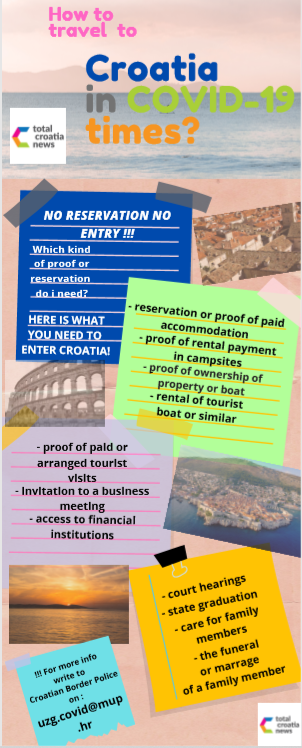
(TCN-ova infografika s najvažnijim naglascima)
Čini se da su službene instance u Hrvatskoj konačno počele organizirati neke podatke na jednom mjestu, a službeni su podaci - ili bi barem trebali biti - najpouzdaniji.
Stoga će današnji izvještaj zapravo biti serija linkova na mjesta gdje možete pronaći najbolje informacije. Također, dajemo vam i adrese e-maila preko kojih možete pisati Ministarstvu turizma i nacionalnoj Hrvatskoj turističkoj zajednici.
Turistička zajednica ima stranicu s pitanjima i odgovorima o Koroni, koju sad redovito ažuriraju. Ako ne možete tamo pronaći podatke koje tražite, službeni savjet jest: Za pitanja vezana za putovanja u Hrvatsku, a koja nisu odgovorena na ovoj stranici, pošaljite e-mail na adresu This email address is being protected from spambots. You need JavaScript enabled to view it., cc This email address is being protected from spambots. You need JavaScript enabled to view it..
Postoji još jedna predložena adresa e-maila za kontakt, ponovo sa službene stranice: "Svi drugi strani državljani koji imaju poslovni razlog, a koji se sad ne može predvidjeti, a koji nemaju potrebnu dokumentaciju, trebali bi poslati svoju namjeru da prijeđu državnu granicu (uđu u Republiku Hrvatsku) na adresu emaila This email address is being protected from spambots. You need JavaScript enabled to view it., a njihov će zahtjev biti riješen u najkraćem mogućem vremenu.
Evo i linka na stranicu Ministarstva turizma o COVID-19 - sretno!
Možete pratiti i službenu web-stranicu Vlade posvećenu Koronavirusu, koja ima i dio na engleskom jeziku. Ona svaki dan donosi nove podatke o oboljelima u 14 sati, te daje korisne informacije na engleskom jeziku. Među posljednjim člancima ističu se:
Preporuke Hrvatskog zavoda za javno zdravstvo za hrvatske i strane državljane za prelazak granice.
Idete na put? Sve informacije na jednom mjestu!
Granice
Službene trenuačne informacije o stanju na granicama, HAK.
Slovenija ukida sva ograničenja za hrvatske državljane koji ulaze na njihov teritorij. (19. svibnja)
Ministar turizma otkriva kad će se granice otvoriti za Slovake, Čehe, Mađare i Austrijance. (20. svibnja)
Izvještaj s putovanja: vožnja iz Velike Britanije do Hrvatske 19.-20. svibnja 2020. (20. svibnja)
TCN posjećuje granicu sa Slovenijom 17. svibnja 2020., kako bismo se uvjerili u procedure i stanje na terenu. (17. svibnja)
Možete proći kroz Bosnu i Hercegovinu kako biste došli u Hrvatsku. Ovdje pronađite službene informacije o putovanju u BiH.
Čitatelj je primio ovaj odgovor kad je pitao kako prijeći granicu. Link na dnu vodi na stranicu na hrvatskom jeziku, iako s te stranice možete doći do engleske verzije.
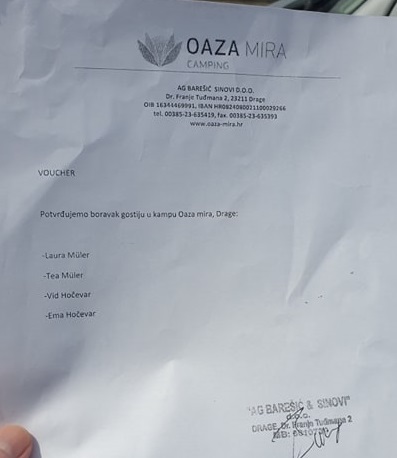
Postoji doza nejasnoće oko toga trebate li imati pečatiranu potvrdu da imate rezervirani smještaj i/ili dogovoren poslovni sastanak. Moje iskustvo s hrvatskom birokracijom jest da nikad ne možete imati dovoljno pečata na svojim dokumentima, stoga vam savjetujem da nabavite barem neki pečat. Kad sam 17. svibnja otišao na granicu kako bih iz prve ruke vidio stanje, jedan je slovenski turist zamolio smještaj u Hrvatskoj da mu izdaju ovo. Ali, to će vam moći potvrditi Ministarstvo na This email address is being protected from spambots. You need JavaScript enabled to view it..
Ovo su službeni savjeti iz Bosne i Hercegovine o tome kako ući u Hrvatsku (možda ovi savjeti postoje i na nekoj službenoj hrvatskoj stranici, ali ja ih ne mogu pronaći):
Ako strani državljanin želi prijeći državnu granicu, mora ispuniti jedan od sljedećih uvjeta:
1. posjedovati dokumentaciju koji dokazuje vlasništvo nad nekretninom u Republici Hrvatskoj ili vozila (vrijedi i za najam), ili dolazi u Republiku Hrvatsku na pogreb (treba posjedovati prikladnu dokumentaciju za to dokazati). Nakon što ispune uvjete, strani državljani mogu prijeći državnu granicu, te ih se registrira te unosi mjesto/adresa gdje će odsjesti ili gdje posjeduju imovinu, broj telefona za kontakt i vrijeme boravka, odnosno kad planiraju napustiti Republiku Hrvatsku.
2. Ako imaju dokumentaciju koja dokazuje poziv neke hrvatske tvrtke, ili poziv na poslovni sastanak. Za ove putnike, neophodno je unijeti mjesto/adresu gdje će odsjesti, kao i broj telefona za kontakt te vrijeme boravka, odnosno kad planiraju napustiti Republiku Hrvatsku.
3. Svi drugi strani državljani koji imaju poslovni razlog, koji ne može biti predviđen u ovom trenutku, te nemaju potrebnu dokumentaciju, trebaju biti upućeni da svoju namjeru da prijeđu državnu granicu (uđu u Republiku Hrvatsku) najave na adresu e-maila This email address is being protected from spambots. You need JavaScript enabled to view it. na što će im biti odgovoreno u najkraćem mogućem roku.
Cestovni promet
Najnovije informacije iz HAK-a.
Trajekti
Najnovije informacije iz HAK-a.
Raspored trajekata i katamarana Jadrolinije.
Zračni promet
Detaljnu analizu zračnog prometa u Hrvatskoj u budućnosti možete pročitati u nedavnom intervjuu s Maxom Oldorfom, COO-om tvrtke ch-aviation :
Letovi prema Hrvatskoj nakon korone: Max Oldorf iz ch-aviation
Croatia Airlines upravo je objavila ažurirani red letenja za 21.-28. svibnja. Sljedeći tjedan dodat će i liniju Amsterdam - Zagreb. Puni raspored.
Od 4. svibnja 2020. na svim letovima Croatia Airlinesa obavezno je nositi maske na licu. Svi putnici obavezni su tijekom leta imati na licu maske ili druga prihvatljiva pokrivala. Maske na licu moraju biti tijekom cijelog boravka u kabini letjelice.
Prihvatljiva rješenja:
pamučne maske za lice s dva sloja
medicinske (kiruruške) maske
filtrirajuće maske s ili bez ventila (FFP2 ili N95)
Kontaktni centar CA: 0800 77 77 (besplatni pozivi iz Hrvatske), 072 500 505 ili +385 1 66 76 555. Za više detalja pogledajte link.
Zračna luka Dobrovnik- Ponovo se uspostavlja let na relaciji Zagreb-Dubrovnik-Zagreb od 11. 5. 2020. Croatia Airlines će letjeti dva puta dnevno. Više informacija.
Zračna luka Osijek - Od 27. 4. ponovo se otvara poslovnica u Pothodniku. Dok su na snazi mjere prevencije, bit će otvorena 9-17 radnim danima. Više informacija možete dobiti na e-mailu This email address is being protected from spambots. You need JavaScript enabled to view it. i telefonu +38531284611. Preporuča se postavljanje pitanja na navedenu adresu emaila. Više informacija.
Zračna luka Rijeka - Više informacija.
Zračna luka Zagreb - Više informacija.
AirBaltic - Svi letovi AirBaltica su otkazani od 17. 3. do 17. 5. 2020. connections are suspended from March 17 to May 17, 2020. Više informacija.
Air France - Od 11. svibnja, maske su obavezne na svm letovima. Zbog korona virusa, smanjili su broj letova za 90 % i to smanjenje vrijedi do kraja svibnja. Zbog zatvaranja zračne luke Paris-Orly, svi letovi idu preko zračne luke Paris-Charles de Gaulle. Više informacija.
Air Canada je otkazala sve letove između Toronta i Zagreba tijekom ljeta 2020.
Austrian Airlines, dio Lufthanse, odlučio je otkazati sve letove do kraja svibnja 2020. Više informacija.
British Airways - Najnovije informacije.
Czech Airlines - Maske su obavezne na svim letovima. Više informacija o rasporedu letenja.
easyJet - Odlučili su prizemljiti sve letjelice do daljnjega. Više informacija.
Emirates - Emirates ponovo pokrenuo ograničen broj putničkih letova za putnike koji napuštaju UAE. Više informacija.
Germanwings - Germanwings više ne leti.
KLM - Posljednji podaci.
Lufthansa - Više informacija.
Ryanair - Ograničeni raspored letova koji vrijedi do 28. svibnja 2020. Više informacija.
Turkish Airlines - Svi međunarodni letovi su otkazani do 28. svibnja 2020. Više informacija.
Qatar Airways - svi direktni letovi između Zagreba i Dohe su otkazani do 31. svibnja 2020. Fleksibilost pri promjeni planova letenja do 30. rujna 2020. Za više informacija, obratite se direktno njihovom uredu u Zagrebu na +385 (0)1-4961110 / 111, e-mail: This email address is being protected from spambots. You need JavaScript enabled to view it. ili ovdje provjerite detalje.
Wizz Air - Početkom svibnja lete iz Budimpešte za Atenu, Barcelonu, Berlin, Birmingham, Basel, Dortmund, Eindhoven, Gothenburg, London, Liverpool, Madrid, Podgoricu, Sarajevo, Stockholm and Targa Mures. Više informacija.
Sve gore navedeno su službene informacije. Dolje pogledajte popis članaka na TCN-u (na engleskom jeziku) koji se osvrću na vijesti iz zračnog prometa:
Eurowings to Resume Flights - Timetable Here
Flights to Croatia: Korean Low Cost Carrier T’Way Planning flights from Seoul (May 19)
Ryanair Significantly Reduces Summer Routes to Croatia (May 18)
Is Eurowings Returning to Croatia this Summer? (May 16)
Croatia Airlines Already Beginning to Reduce Number of Flights (May 16)
Hope for 2021? American Airlines Dubrovnik - Philadelphia Loaded for June 4, 2021 (May 14)
CEO Eddie Wilson: Ryanair Zadar Base Will Not Go Ahead (May 13)
Ryanair to Croatia Planned for July: Zadar, Split, Dubrovnik, Rijeka, Pula Flight Info (May 12)
British Airways Will Fly to Zagreb and Split from June (May 12)
Flights to Croatia: Korean Air Cancels Seasonal Zagreb Service, Air Transat Delayed (May 9)
Vlakovi
Najnoviji podaci HAK-a o željezničkom prometu.
Autobusne linije
Najbolji izvor podataka o rasporedima autobusnih linija pronašli smo na stranici GetByBus.
Situacija se stalno mijenja, te da biste dobili najnovije vijesti o prometnom stanju i drugim aspektima krize uzrokovane koronavirusom, predlažemo vam da pratite stranicu na TCN-u posvećenu COVID-19.
Recent relevant tourism-related articles
Tourism in the Corona Age: 10 Virtual Ways to Discover Stari Grad
Dubrovnik Announces Marketing Plan to Bring Back Airlines
Visit Zagreb Now: Never Has the City Been More Beautiful
Listen to the Free Daily Concerts on Hvar: Birdsong Live
Dubrovnik Finally Realises City Wall Prices Are Extortionate, Price Slashed
Czechia to Open Borders for Croatians as of 8 June
Easing Coronavirus Measures, Around 8700 Tourists Arrive in Croatia
Ako imate relevantne i potvrđene turističke informacije koje biste rado vidjeli na ovom popisu, molimo vas pošaljite nam ih na This email address is being protected from spambots. You need JavaScript enabled to view it., sa naslovom Travel update.
Jeste li se već priključili Viber zajednici Total Croatia Travel INFO? Pročitajte o njoj više ovdje.
Dnevno ažurirane vijesti, podaci iz priopćenja za medije u 14:00
Posljednji podaci i statistike o COVID-19 u Hrvatskoj, Velebit.ai
20. svibnja Nacionalni stožer civilne zaštite objavio je:
U Hrvatskoj ima 2234 slučajeva infekcije koronavirusom, 2 nova slučaja u posljednjih 24 sata. Preminulo je 96 ljudi, oporavilo se 1978 bolesnika. Trenutačno je na respiratoru 8 bolesnika.
Do sada je testirano ukupno 57,021 ljudi, od čega 1221 u posljednja 24 sata.
Trip Report: Driving from UK to Croatia on May 19 - 20, 2020
May 21, 2020 - Travel from the UK to Croatia IS possible. Photographer timotej on his journey across Europe on May 18 - 19, 2020.
With so much uncertainty in travel at the moment, finding credible sources on travel in the current reality is proving quite difficult. Last week TCN reported on a Belgian national had managed to drive from Brussels to the south side of Hvar, which was a very popular post.
I am very grateful to photographer timotej for allowing me to publish details of his recent trip, from the UK to Croatia. This was timotej's experience:
If anyone is interested this was my experience driving from England to Croatia on 18-19 May, 2020?
For this journey I had to travel through England, France, Holland, Belgium, Germany, Austria, Slovenia to enter Croatia. Here was the border experience at each country. I was traveling with a British passport. 14-hour drive...
England - Asked to see and scan the passport and looked at car papers. Asked where are you traveling to and if I had Covid19 at any time. Let me through. Then into the Euro tunnel to cross the sea..
France - Shockingly no French border control after exiting the Euro tunnel. There was nothing from the French on the English side too. Nothing going out..
Holland - No border control. In and out..Belgium - No border control. In and out..Germany - No border control. In and out..
Austria - Asked to see passport and car papers. I think they are only asking for car papers because it’s a nice car and I look too young to own it. Nothing on the way out..
Slovenia - The only country that checked passport on the way in and out. Nothing more..
Croatia - Like England checked AND scanned passport. Asked destination where I’m going to in Croatia. I was entering during morning hours. They didn’t ask for any other proofs for anything..
Other observations:.
1. You must wear a mask to enter petrol stations everywhere.
2. The roads are almost empty of cars. Just trucks and lorries.
3. The women at the border controls were much more serious, and the men totally relaxed...
This was the experience. This does not mean you will 100% for sure have the same one. It’s also possible things change any day/week. Which is why I believe it’s important for every country to provide daily updates for everyone on any changes...If anyone makes a trip to Croatia by plane or car let me know how it goes. Really interested.
Have you driven across Europe to Croatia in the last few days? Please contact us with your experiences on This email address is being protected from spambots. You need JavaScript enabled to view it. Subject Across Europe with your stories.
Gari Cappelli Reveals When Borders Will Open for Slovaks, Czechs, Hungarians and Austrians
May 20, 2020 - Tourism Minister Gari Cappelli announced on Wednesday that Croatia would open the border to citizens of Slovakia, the Czech Republic, Hungary and Austria on May 29, and before that, an application would be published that would allow faster flow through the border.
Sibenik.in reports that Cappelli made the statement at the National and University Library following a video conference by EU tourism ministers, the second held in the last month as part of Croatia's EU Council presidency.
He said that when there are similar epidemiological situations in certain countries, according to the principle of non-discrimination, the possibility of opening borders will be agreed bilaterally.
"We had this agreement with Slovenia and it works for a start," says Cappelli, announcing that the same will be done on May 29 with four or five other countries, about which details are still being agreed, and that will include Slovakia, the Czech Republic and Hungary and Austria.
"The citizens from these countries, for economic reasons, owners of houses, ships and the like, can come to Croatia, similarly to Slovenes, without being quarantined," Cappelli explained.
With the opening to these Central European countries, along with Germany and later Poland, Croatia completes more than 60 percent of its total tourist traffic, says Cappelli, adding that guests from Italy can be expected later.
He notes that everyone agrees that the countries are going to bilateral agreements on the arrival of tourists, and says that most EU countries are announcing loosened measures in the tourism and hospitality sector by June 15.
He also announced that the Ministries of Administration and Tourism, together with the Ministry of the Interior, are preparing an Internet application for the fastest possible flow of citizens across the border and facilitating control, and will be completed before May 29. It will be made for entry into Croatia and will be offered to other countries.
The Commission's Economic Recovery Package on May 27
The meeting of the Ministers of Tourism was attended by, among others, the European Commissioner for the Internal Market Thierry Breton and the Commissioner for Transport Adina-Ioana Valean, in the context of the fact that tourism and transport were most affected by the coronavirus crisis.
The publication of the Commission's proposed measures for the recovery of the European economy is expected on May 27, when it should be known how much funding each country will receive, including Croatia, and how much it will be possible to help these two sectors.
Namely, French President Emmanuel Macron and German Chancellor Angela Merkel on Monday proposed the establishment of a fund of 500 billion euro for the most affected regions and economic sectors in the Union. This is financial assistance, not credit, and the Commission should raise that amount through common bonds.
Vouchers were also discussed
European tourism ministers also discussed the issue of vouchers at the meeting, and no consensus has been reached, with some countries supporting their introduction.
“There we were still in some way at odds, this will be discussed in another two to two weeks and then some conclusions will be drawn based on which we will take a common position,” Cappelli said.
Namely, the Commission recently announced that it maintains that consumer rights must be protected, which stipulates that money must be returned for canceled flights if the passenger insists, with the proviso that it is allowed to offer a voucher, but only if the passenger agrees.
Also, the Commission proposes that the vouchers offered by travel agencies for canceled tickets be attractive enough so that citizens do not insist on a refund, which remains an unquestionable right.
For the latest travel info, bookmark our main travel info article, which is updated daily.
Join the Total Croatia Travel INFO Viber community.
To read more about travel in Croatia, follow TCN's dedicated page.
350 Players and Staff in Croatian First League Test Negative for COVID-19
May 20, 2020 - The results of genetic testing for the SARS-CoV-2 virus in a sample of 350 players and members of the professional staff of Croatian First League clubs ruled out the existence of COVID-19 in the tested population.
HNS reports that the second phase of testing continues this week, which includes serology tests in addition to RT-qPCR molecular tests to determine the presence of specific IgA and IgG antibodies. The presence of igG antibodies is important because it confirms that the person has overcome the disease.
In his efforts to prevent the spread of Covid-19, the president of the Health Commission of the Croatian Football Association, Dr. Dragan Primorac and co-workers developed a comprehensive model that includes, among other things, the application of specific tests to determine the existence of genetic material of SARS-CoV-2 virus, using molecular tests RT-qPCR. Specifically, this analysis proves the presence of viral (N, E, RdRP) genes of the SARS-CoV-2 virus. Determining the presence of viral genetic material is done from a sample of nasopharyngeal swabs (part of the pharynx behind the nasal cavity) since the nasopharynx is one of the places the virus is concentrated after entering the human body. In this model, genetic testing is done at intervals of five days, in order to avoid obtaining false-negative results. Namely, the so-called latency period (the period from contact with the virus to the production of new virus particles) lasts approximately five days.
The project, which is already known in the world today as the "Croatian model", and which was published in the prestigious Journal of Global Health, was strongly supported by Fifa and Uefa. The Teaching Institute for Public Health “dr. Andrija Štampar", Special Hospital Sv. Katarina, International Society for Applied Biological Sciences (ISABS) and Genos Laboratory. Logistical support for the project is also provided by the "HNS Commission for the Covid-19 Pandemic", which includes members of the HNS Health Commission and scientists from the Clinic for Infectious Diseases "Dr. Fran Mihaljević”, Teaching Institute for Public Health "Dr. Andrija Štampar" and the Croatian Institute of Public Health.
The Croatian Football Federation especially emphasizes the great cooperation with clubs, players and members of the professional staff who acted extremely responsibly during the implementation of this project. Also, the Croatian Football Federation continues to implement all measures prescribed by the National Civil Protection Headquarters of the Republic of Croatia.
To read more about sport in Croatia, follow TCN's dedicated page.
Croatia Travel Update, Questions Answered in Real Time: March 21, 2021
March 21, 2021 - TCN Croatia Travel Update carries the most relevant updates on travel, borders, and flights to Croatia at one place, updated daily several times, while TCN Total Croatia Travel Info Viber community (click on the link to join - you will need to download the Viber app) provides you with live answers to any question, as well real-time experiences of travellers to Croatia.
Follow our live updates on the situation in the earthquake-hit areas of Croatia here; find out how you can donate here.
Those arriving to Croatia from Zanzibar (Tanzania) were added to the list of those that need to have a negative test AND self-isolate for 14 days. On January 13, the new border rules for entry were announced. On January 15, the rules are further explained, and the biggest change is that travellers arriving in Croatia from the United Kingdom, the South African Republic, the Austrian region of Tyrol and Brasil need to have a negative PCR test AND they need to self-isolate for 14 days (or have their self-isolation shortened if they pay for another test, at least 7 days after they've entered Croatia), no matter what their citizenship is.
Basic rules regarding entry in Croatia as of December 1st, 2020 are:
- travellers, regardless of their citizenship, arriving from the ECDC "Green List" region, (the list of Green List regions is increasing with every update, so please consult the website or the map below), or from a country listed on the so-called EU "Safe list", who can prove that they haven't spent any time outside of those Green/safe regions while travelling to Croatia, have no symptoms or have not had close contacts with infected persons are allowed to enter Croatia without a test;
- citizens of the EU/EEA (EU 27 + Iceland, Lichtenstein, Norway, Switzerland, as well as Andorra, Monaco, San Marino, and the Vatican and including Croatian citizens) or a non-EU citizen with an EU residence permit (or a member of their family, with documents to prove the kinship) are allowed to enter Croatia no matter where they come from and are not required to provide a reason, but need to have a negative PCR test, not older than 48 hours, or get tested upon entry (at their own expense) and self-isolate until they get the results (up to 10 days); the same rule is applied to the third-country nationals travelling from an EU/EEA region;
- third-country nationals arriving from anywhere else (except for the UK and the SAR) will be allowed entry in Croatia if they have a negative PCR test, not older than 48 hours (they will also be given an option to get tested upon entry at their own expense and self-isolate until they get the results), HOWEVER, they will have to prove they are travelling for urgent personal/family reasons, business reasons or other economic interest (including seafarers).
You can find more details, including some exceptions to the rules listed above in the LATEST OFFICIAL GUIDELINES IN ENGLISH FROM THE CROATIAN BORDER POLICE (December 1)
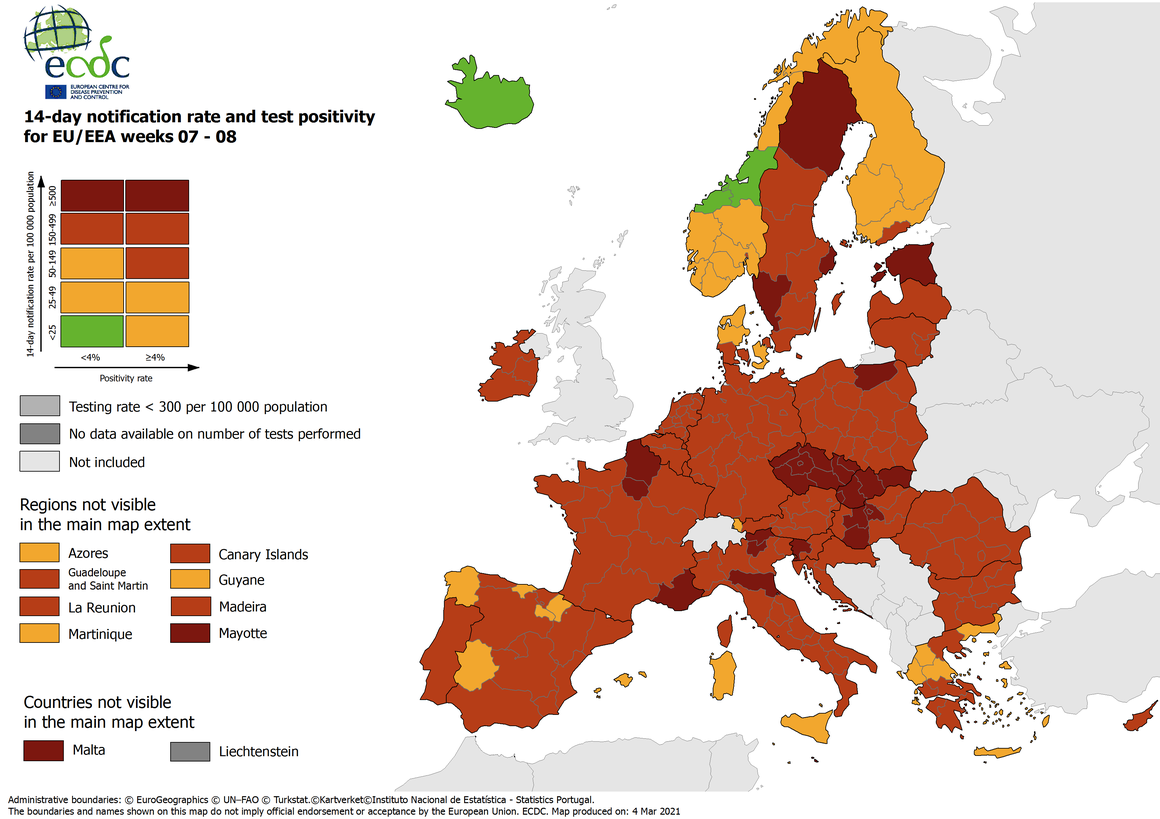
834 new cases, 20 deaths in the last 24 hours; Daily Corona Update (March 21)
There have been 834 new recorded COVID-19 cases in Croatia in the last 24 hours, so 6,922 cases of COVID-19 remain active. 982 people are still hospitalized, with 90 patients on a ventilator.
6,884 people were tested in the last 24 hours, for a total of 1,475,016 since the crisis began. 257,639 people have been confirmed as infected with COVID-19 in Croatia in total (since February 25th, 2020). 244,944 people have recovered and 5,773 have died (20 patients have died in Croatia in the last 24 hours).
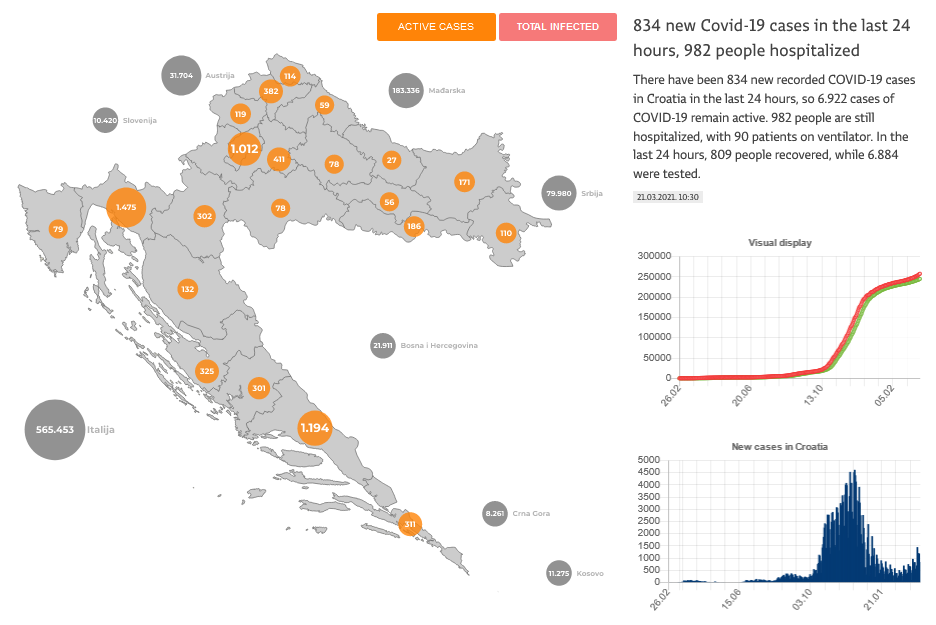
Click on your language to get the latest Croatia Travel Update in your language and read the of Total Croatia News in your language: German - Deutch, Slovenian - slovenščina, Polish - polski, Czech - čeština, Slovak - slovenčina, Hungarian - magyar, Serbian - srpski, Italian - italiano, French - français, Spanish - español, Portuguese - português, Dutch - Nederlands, Danish - dansk, Norwegian - norsk, Swedish - svenska, Finnish - suomi, Russian - русский, Ukrainian - українська мова, Romanian - românește, Bulgarian - български, Albanian - shqip, Korean - 한국어, Chinese - 汉语, and Croatian - hrvatski.
Travelers are advised to fill out the form at http://entercroatia.mup.hr before arriving at the border for faster border crossing.
TravelDoc.aero is a seemingly great service to check on the entry requirements for any country and nationality; however it doesn't seem to be updated to reflect the changes of November 30. Check out the website and your travel eligibility to Croatia and anywhere else here.
Check the official reopen.europa.eu website for detailed information for EU countries.
As US Embassy States Croatia Closed, American Tourists Continue to Arrive (December 3)
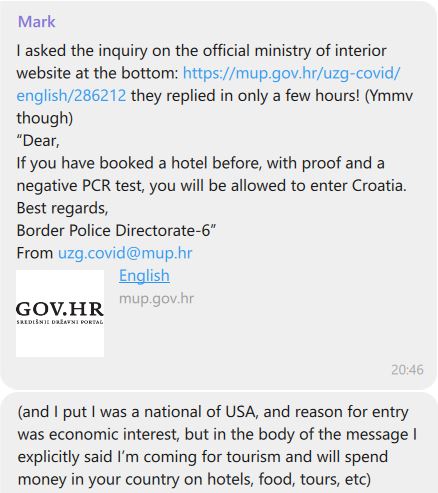
Croatia Extends Anti-Epidemic Measures After March 15 (March 10)
Cafe Terraces to Work from 6 am to 10 pm, No Music, Says COVID Response Team (February 26)
Index Finds Out New Rules for Cafes, Restaurants, and Sports in Croatia (February 25)
Prime Minister Plenkovic: Cafe Terraces Can Open on Monday (February 25)
New Official Croatian epidemiological measures (January 30)
New Official Croatian Border Crossing Rules, Recommendations (January 16)
Croats, Brits with Croatian Residence Can Return from UK to Croatia (January 1)
Latest updates from the Petrinja earthquake
Croatia Imposes Temporary Ban on Flights from UK over New Coronavirus Variant (December 21)
Travel to Croatia in December 2020: TCTI Viber Community Traveller Experiences (December 15)
Croatian Government Agreed on Fines for Violating Measures, Awaiting Parliament Confirmation (November 30)
New Measures Until December 21 Announced by Prime Minister Plenkovic (November 26)
What is the Number of Ventilators in Croatia? (November 16)
Croatia Travel Update: Answers to Recent FAQs (December 2)
Travel to Croatia: Real-Time Feedback from Total Croatia Travel INFO Viber Community (September 1)
Where Can You Get Tested for COVID-19 in Croatia? (September 1)
Where to Get Tested Before Arriving in Croatia? (August 9)
Flying to Croatia? Why You Should Print Out These IATA Guidelines (June 16)
OFFICIAL INFO PAGE FROM THE CROATIAN BORDER POLICE, with FAQ and form to ask questions is the best source of official advice (available in English, German, and Croatian, updated on December 1) .

What is the entercroatia.mup.hr Form and Do You Need to Fill It? (June 22)
It is recommended that travellers fill out border entry forms at entercroatia.mup.hr, to speed their passage across the border and into Croatia. Visitors will only have to provide their name, place where they're staying, mobile phone number, and email address. An additional reason to do so that is that special fast-track Enter Croatia lanes have been introduced at some borders for quicker entry.
While you wait for the answers from Croatian Border Police, check the real-life experiences of tourists coming to Croatia and get your questions answered in our Total Croatia Travel INFO community (you will need to download the Viber app). This Viber community has been an excellent source of information exchange, where tourist questions are getting answered in real-time. Here are 10 things I learned from the Viber community in the first days. If you have a question or some verified useful travel info to contribute, join us. Please make sure you read the pinned message and our FAQ article before asking any questions.
Borders (This section is being updated regularly to reflect the changes of November 30)
LATEST OFFICIAL GUIDELINES IN ENGLISH FROM THE CROATIAN BORDER POLICE (December 1)
Croatia Announces New Border Rules, Expands PCR Test Requirements
The changes of November 30 brought some changes to just about every category of traveler to Croatia: as of December 1st, almost all Croatian and EU citizens need to have a negative PCR test in order to enter Croatia (there are few exceptions, including those arriving from the ECDC "Green list"), or get tested upon entry and self-isolate until they have the results. As for the third-country nationals, if they are arriving from within the EU, the same rules apply to them. If the third-country nationals want to enter Croatia after spending time elsewhere, they will be asked to provide proof that they are travelling for urgent personal/family reasons, business reasons or other economic interest (including seafarers). We have not been able to officially confirm if potential tourist arrivals will continue to be regarded as "other economic interest", as has been the case before this change. Please consult with your embassy and the Croatian authorities to make sure you'll be able to enter Croatia.
There is no age limit for testing in order to enter Croatia, which means that children need to get tested as well.
One important piece of information we have heard unofficially is that those travellers who have already had COVID-19, and who have since recovered, will not be required to present a negative PCR test or be given a self-isolation measure. They need to be able to prove with medical documentation that they have had the disease. That documentation needs to reflect that the final day of their disease was not within 14 days of arrival at the Croatian border or more than 90 days before that.
Follow our regularly updated article to find out if there are any measures imposed when you leave Croatia and enter other countries (updated on November 2)
This section gets regularly updated, as more information becomes available. For more answers in the meantime, please follow our Answers to Recent FAQs (not updated to reflect the changes of Nov 30) and Where Can You Get Tested in Croatia, as well as the Croatian Police official info page, regarding crossing the Croatian border during COVID-19, in English (not updated to reflect the changes of Nov 30). Use the e-mail address This email address is being protected from spambots. You need JavaScript enabled to view it. for additional questions and official confirmations from the Croatian Border Police. US citizens should also check the US embassy in Croatia travel advisory.
For the latest rules and information on who can enter and transit Bosnia and Herzegovina, Serbia and Montenegro please check the linked official government pages.
Update on July 16: citizens of the European Union and Schengen countries, as well as visa- or residence permit-holders in the EU countries, are allowed to enter Bosnia and Herzegovina, with a negative PCR test for coronavirus, not older than 48 hours. We've received confirmation that the Croatian citizens are exempt from this, ie. that they can enter Bosnia and Herzegovina freely. Please follow Official Bosnian travel advice for more updates. Transit through Neum will be exempt from this rule, you will just have to leave the territory of Bosnia and Herzegovina in an hour (it's 23 km, so it shouldn't be a problem).
For more information regarding travel to Slovenia and Montenegro, please visit our sister sites:
Total Slovenia News (Slovenia modifies their red list: 8 Croatian counties on the Red list, other on the Orange list, September 28, 2020)
Total Montenegro News (new measures in force in Montenegro, August 7, 2020)
For comprehensive overviews on crossing the Croatian borders, check out the Total Croatia 2021 guides: Slovenia, Bosnia and Herzegovina (updated on Feb 26, 2021)
You can see the current situation at the borders through the border webcams. Simply select 'Border Crossings' under 'Traffic cams' in the menu on the left.
What Do the Green, Yellow & Red Lists Mean for Entering Slovenia During the Corona Crisis? (July 5, Total Slovenia News)
Behind the Scenes at the Croatian Border Control System: AMAZING! (June 9)
Flights
Check the latest flight situation at Croatia's airport websites: Zagreb, Split, Zadar, Pula, Dubrovnik, Rijeka, Osijek, Brač and Lošinj.
The Croatia Airlines contact center is available on the following numbers: 0800 77 77 (toll-free calls from Croatia), 072 500 505 or +385 1 66 76 555. More info and Live Schedule.
Roads, Ferries, Buses, and Trains
Latest information on the roads from HAK.
Latest ferry information from HAK.
Jadrolinija ferry and catamaran timetable.
Croatia Airlines and Jadrolinija Team Up to Improve Croatia's Tourist Offer (July 24)
For the latest on the trains from HAK.
The best resource we have found for bus timetables is GetByBus.
The situation is constantly evolving, and for the latest on travel updates and all other coronavirus developments, we recommend you follow the dedicated TCN COVID-19 section.
Current Situation
Croatian Tourism Association (Hrvatska udruga turizma) has created a helpful tracker of active COVID-19 cases in various Croatian regions - https://www.croatiacovid19.info/ (the color-coding they use is similar to what ECDC has been using, and is indicative of the 14-day average). For more day-to-day visualizations of COVID-19 situation in Croatia, follow Velebit.ai.
We remind you that the best defense against this virus is to maintain personal hygiene, sanitize, and keep a social distance.
More at: https://www.koronavirus.hr/en.
TCN has a dedicated coronavirus section where you can follow all the latest news.
To see how Croatia coronavirus numbers compare to the rest of EU/EEA please check here.
Looking for more details? The latest tourism and travel articles on TCN are here.
If you have relevant and authenticated tourism updated info to add to this resource, please send it to This email address is being protected from spambots. You need JavaScript enabled to view it. Subject Travel update.
Have you joined the Total Croatia Travel INFO Viber community yet? Learn more about it here.
Visit Zagreb Now: Never Has the City Been More Beautiful
May 20, 2020 - A first visit to post-earthquake Zagreb, and a big surprise - never have I enjoyed visiting the Croatian capital more. Zagreb is magnificent right now.
It is almost two months since the devastating March 22 earthquakes in Zagreb. Like everyone else, I watched the tragic images with heartache. Corona travel restrictions meant that I could not visit, and I had to keep in touch with my friends and TCN colleagues from distance.
With all the yearning for travel, Zagreb was the only place I wanted to visit, to walk its streets, share its pain, empathise with its people.
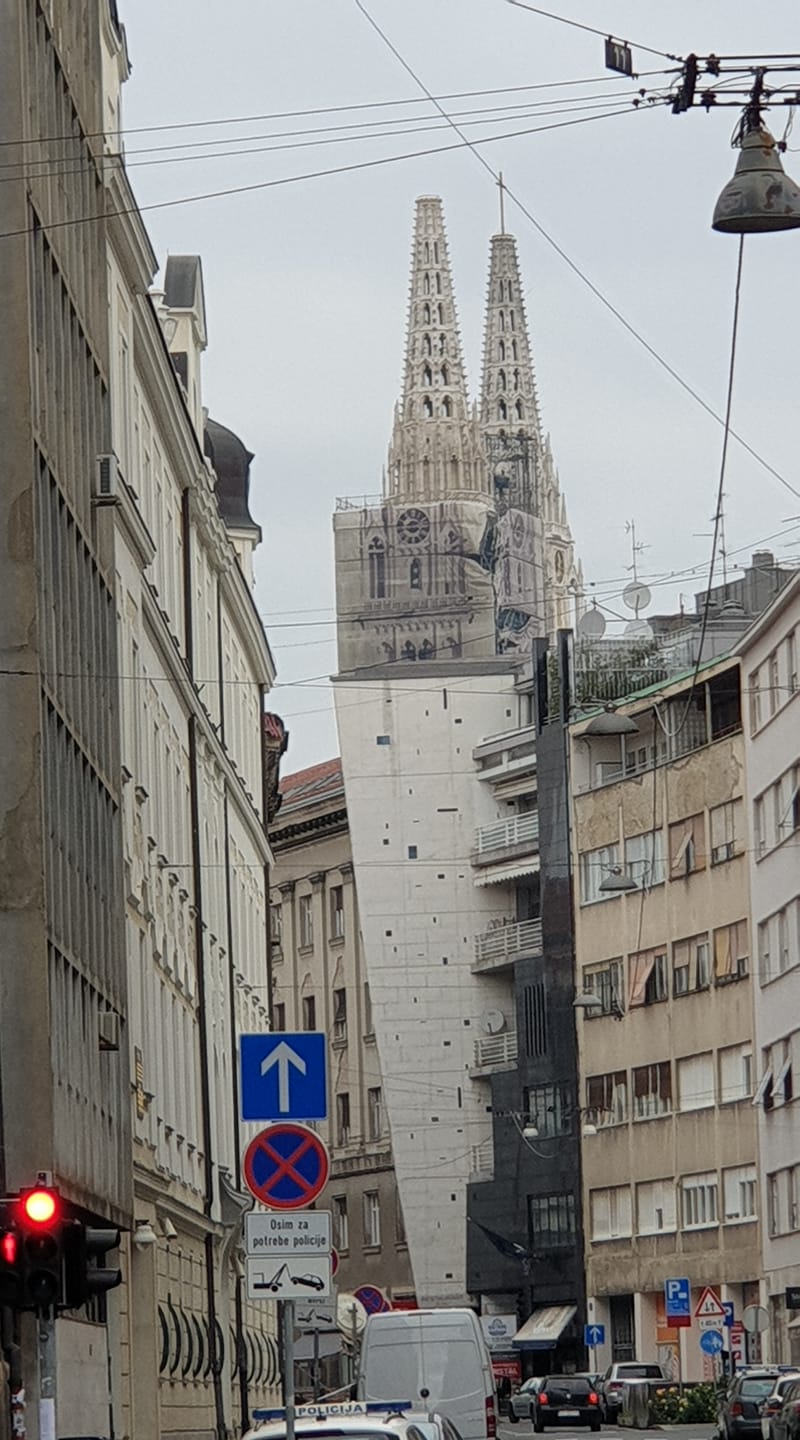
I was actually nervous as we entered the city. What awaited me? And how would greeting friends be in this new lesser-contact world? I also felt a little guilty that while they had been confined to apartments, I had had the freedom of one of the most beautiful islands in the world on Hvar.
What I actually discovered stunned me. For I can genuinely say that I have never found Zagreb more beautiful, more peaceful to roam its streets and parks, or more at peace with itself. Perhaps the little cross on the top of one of the cathedral's spires, a recent addition, was a symbol of that.
I arrived on Sunday, a non-working day in Croatia with elections approaching, and the ruling government reaching out to its conservative base, and so the centre was emptier than usual. Less humans, more birds.
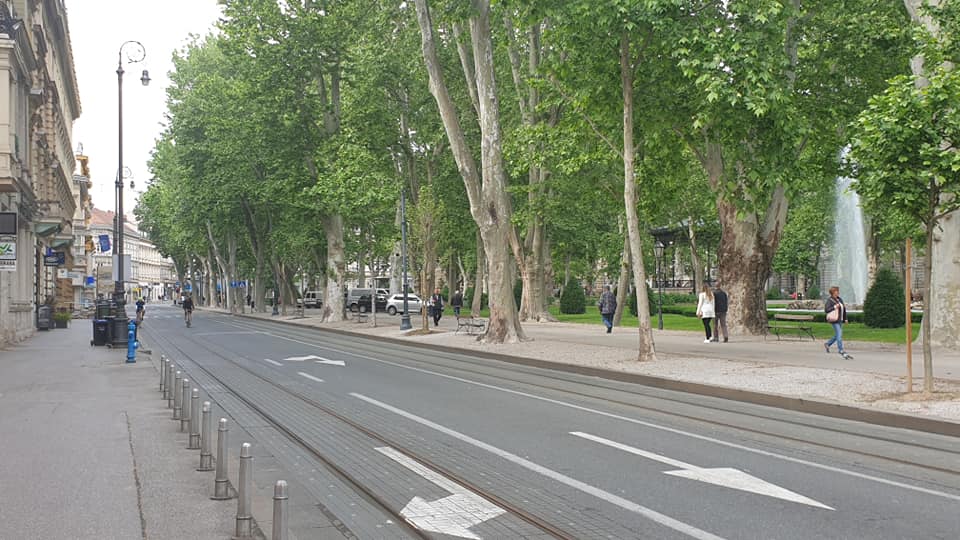
I found myself walking down the middle of the street at times, as there was so little traffic (it was a Sunday, remember). And on Zrinjevac, some new parking spaces. After the earthquakes, residents move them away from the buildings to lessen the risk of damage from another earthquake. I wonder how long this arrangement will last.
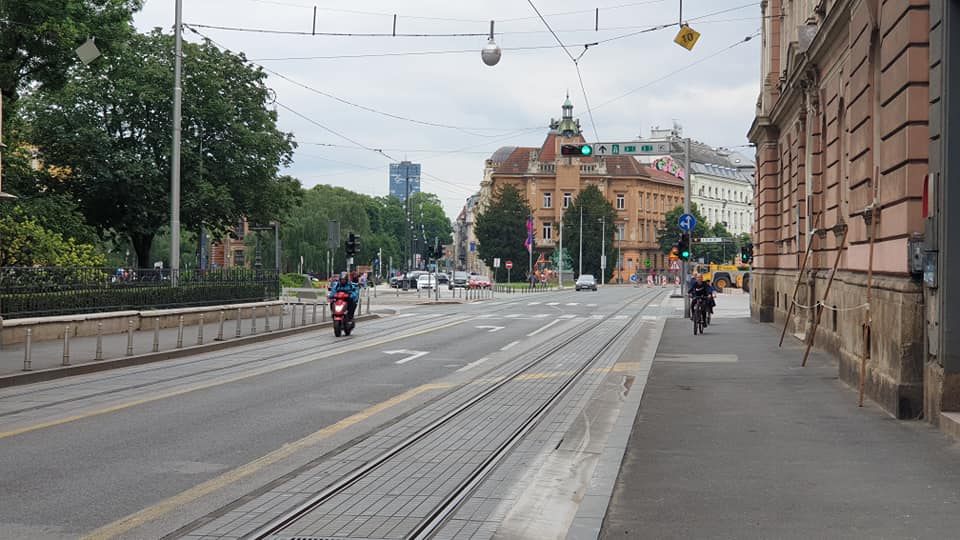
The streets were emptier, the air was noticeably cleaner, Mother Nature was enjoying a relaxing weekend, and the sun was shining. It was divine.
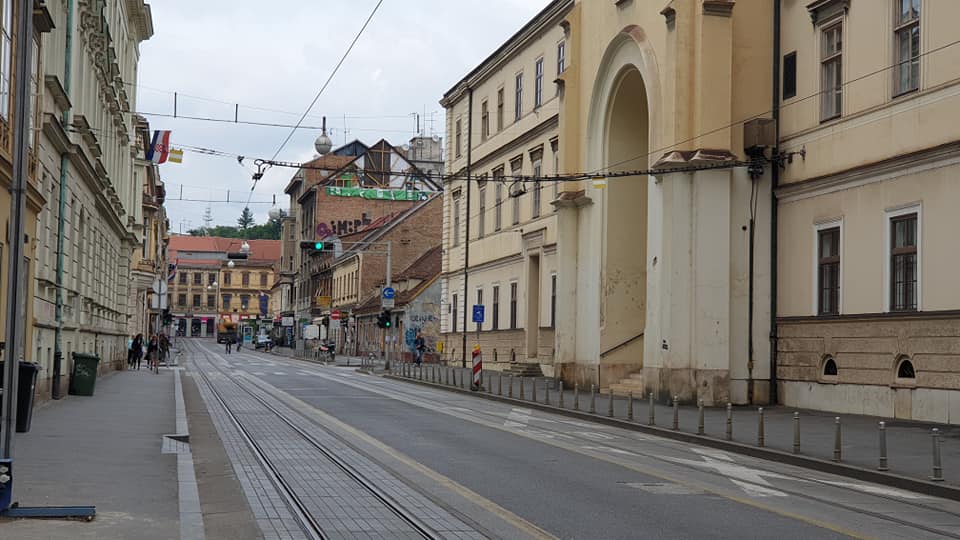
No doubt the shops being shut had a big effect on the lack of people about, but it certainly added to the enjoyment. But one thing I noticed about the people who were out. They were happier, much happier, than the normal faces one sees on the street. I was curious to see how my friends would be after this intense period of their lives. And they were all much more relaxed, calmer and more reflective on what they had been through and the new realities of life. Corona has wreaked havoc and destruction, but it has also contirbuted much to a mindset reset for many people, and they may yet bring great benefits.
Daily life continuing. A family playing table tennis in the park.
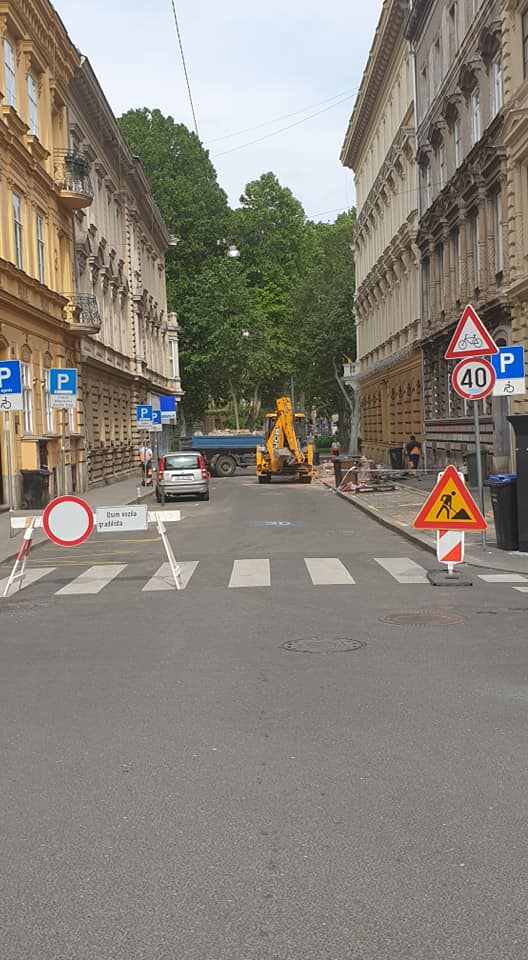
I was expecting to see a lot more devastation around the city. It has been cleaned up extremely well (never have I seen it cleaner) and the rubble which remains has been swept into piles in parking spots.
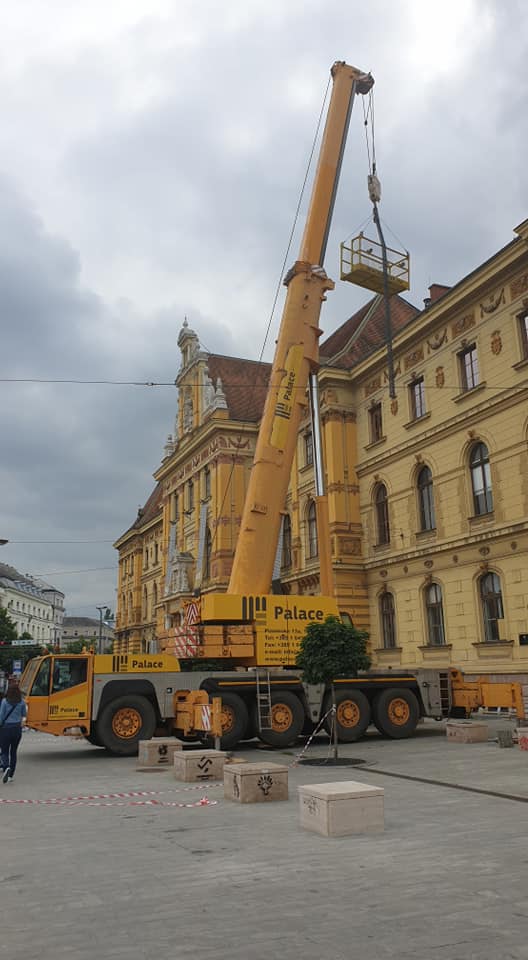
Some streets are closed, and the cranes are out.
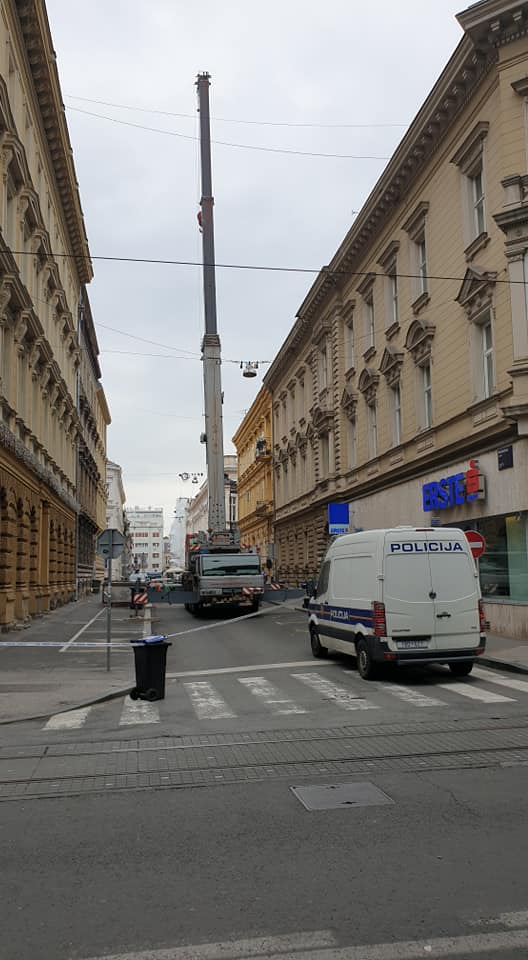
I was expecting a lot more disruption, a lot more cranes. They were there, but there were not a major feature. The major feautures for me were nature, calm, happier people. It was a wonderful thing to experience after months of being at home.
The shops might be shut, but the cranes were working.
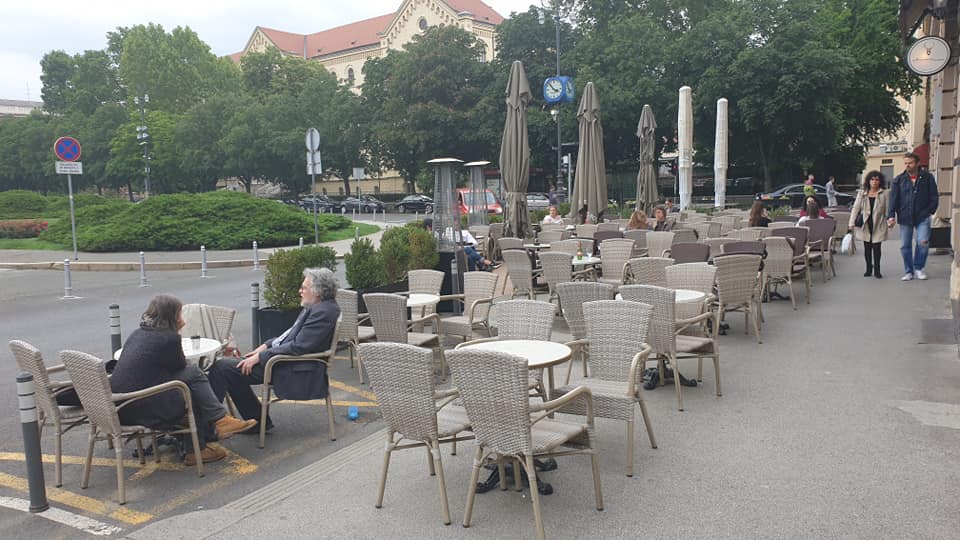
Most cafes were shut (not sure if this was standard for the moment, or due to Sunday), but those that were open were less crowded, more relaxed, fun to chill out in.
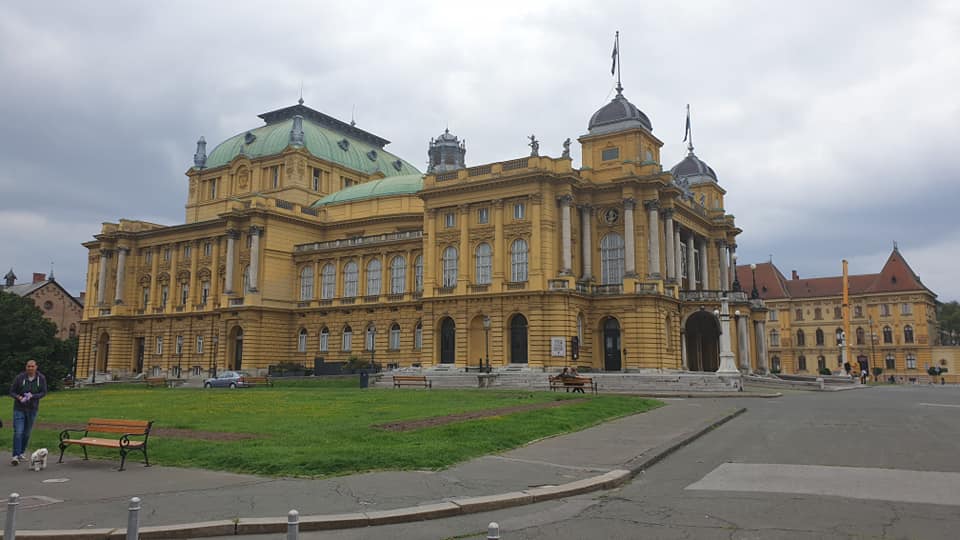
Less people and more time to enjoy the magnificent architecture of the city.
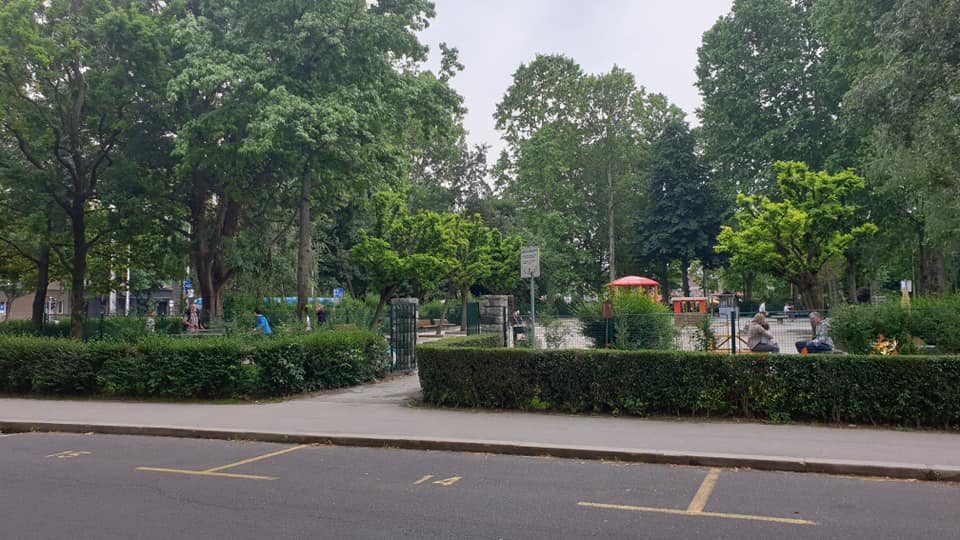
And its nature.
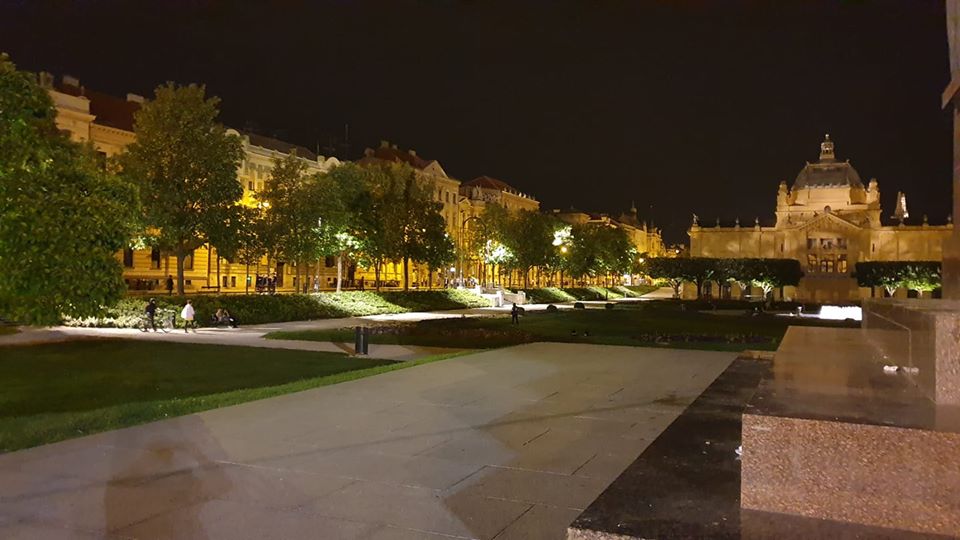
And Zagreb by night was a joy. Just as it felt that I had the island of Hvar to myself during lockdown, so too the city centre of the capital by night.
If you are travelling at the moment and Zagreb is on your radar, visit now, while this magical period of Mother Nature partially controlling the city still exists, as it will almost certainly change when the humans are allowed out to play.
You can learn more about Zagreb in our Virtual Croatia series - Tourism in the Corona Age: 10 Virtual Tools to Discover Zagreb.
Kutjevo Continued Working at Full Capacity Despite Lockdown
As Novac/Matea Grbac writes on the 19th of May, 2020, although the domestic and world economies are gradually opening up again, and people's lives are returning to a slightly altered sort of normalcy, the Croatian economy is still far from out of the woods. Kutjevo has set job preservation as one of its main strategic goals in these strange times.
In these moments of crisis caused by the coronavirus pandemic, preserving jobs has become the biggest challenge for each and every employer. Day by day, we're witnessing the devastating statistics on the growth in the number of unemployed people, of which there are currently just over 160,000 in terms of the Croatian labour market.
In addition to those who simply lost their jobs practically overnight, more and more workers are on the state-guaranteed minimum wage introduced by the Croatian Government in a package of economic measures designed to keep the Croatian economy's proverbial head above the water. Despite the uncertainty and the fact that it is already clear that the plans for this year are one thing, and their actual implementation is something else, one of the most important agricultural producers in Croatia, Kutjevo, has set job preservation as one of the main strategic short-term and long-term business goals. It is for this reason that the Kutjevo winery has no intentions of encroaching on the rights of 622 employees.
''We have 593 full-time employees and 29 part-time ones. Preserving their jobs while also preserving financial stability and uninterrupted production processes is our business priority because the main seasonal work and preparations for harvest that awaits us at the end of August take place on arable land and on vineyards,'' explained Kutjevo Management Board member, Dino Galić.
He pointed out that for now, they have applied only for job preservation measures and that workers' salaries have not been adjusted, but kept at the level they were at before the coronavirus pandemic hit the country, in order to preserve their standards and the respective household budgets of Kutjevo's employees, a move they're extremely (and rightfully) proud of.
''So far, we haven't utilised any of the other measures offered by the Croatian Government to businesses. We believe that as a large system, we have a responsibility to all public and private institutions to fulfill all of our obligations on time. Of course, as long as the financial construction of the business allows that to happen. We're actively monitoring the development of the situation and we're being informed and consulting with all of the relevant institutions regarding possible frameworks and support on a daily basis,'' he emphasised.
In addition to its workers, Kutjevo also takes care of a large subcontracting base within which it has contracted cooperation with as many as 242 farms that take care of a massive 370 hectares of vineyards. Therefore, this well known Croatian company is constantly trying to make consumers aware of the importance of buying and consuming domestic products above all, thus indirectly providing support to the survival of Croatia's many producers.
Kutjevo has stated that even during these economically trying times, they still worked at full capacity and that due to the nature of the work, most of their employees still came to work physically as normal.
''Since we're a company whose primary activity is agricultural production, we worked at full capacity, of course, in compliance with all of the prescribed measures of the National Civil Protection Headquarters in order to protect the health of our employees at the maximum level. I must also point out the contribution of all of our colleagues who, through their efforts and hard work, ensured that work taking place with field crops and in vineyards was done within the given deadlines,'' he emphasised, adding that like many other companies across the country, office work and work related to sales and marketing was organised in a way so that people could work from home.
The closure of the HoReCa system, the plethora of coronavirus-induced economic issues, the rise in excise duties on alcohol and tobacco products - all these represent challenges that the wine industry has faced this year, and we're only in May. In addition to all of these troubles, Galić stated that according to information from the sales index, the growth of wine sales in retail chains is visible, but this data still doesn't go in favour of domestic winemakers. Namely, although the growth is visible, it is more related to imported wines which come in lower price categories, and the sales of top wines from Croatian wineries are unfortunately continuing to decline.
Despite the less than encouraging numbers, they still see something positive in everything. It is precisely the growth of online sales that has flourished in the last two months. Along with the growth of e-commerce, a positive shift, he added, is also visible in the gradual change in the habits of local consumers who seem to be beginning to appreciate quality domestic products more.
''Changes in consumer habits have been visible for a long time. Croats are becoming more and more educated about wines, as well as in pairing that drink with certain meals, thus raising the bar for local winemakers. This is an excellent indicator for us because, in line with this trend, we're constantly investing in production processes in order to achieve better quality,'' explained Galić.
Kutjevo winery, known for its "queen of the cellar", Graševina, sells sixty percent of its wines on the domestic market through hotels and restaurants, which is why it views the reopening of the HoReCa system positively. For example, last year alone, they sold a little more than five million litres of wine through this sales channel on both domestic and foreign markets alone.
''Without caterers and hoteliers, the viticulture sector has no chance to sell wine and maintain the current dynamics. Wine is mostly consumed at gatherings such as celebrations, concerts, weddings and other occasions. We're currently making additional efforts to prepare for the season ahead, despite a large number of questions and unknowns hanging over our heads. We're obliged to deliver the top level of quality to our partners and consumers, regardless of the economic situation through our wine assortment and our service, which we're extremely proud of,'' concluded Kutjevo's Galić.
For more, follow our business and Made in Croatia pages.
TCN Launches Viber Community 'Total Croatia Travel INFO' for Latest Updates
May 19, 2020 - With so much confusion on the current travel situation AFTER CROATIA OPENED BORDERS TO TOURISTS FROM EU, TCN launches a Viber community called Total Croatia Travel INFO to keep people updated with the latest info.. All you need to follow our latest updates is to download Viber application to your mobile or desktop. Join us!
My daughters are laughing at me again.
And I will confess I do look a little ridiculous.
And old.

As the Kings of Accidental Tourism continue their strategy of waiting for tourism to happen, as our heroic minister spouts catching corona-era slogans such as Croatia Breathes Tourism, more and more people are getting confused by the lack of information officially. Simple questions such as who can cross the border, what is the procedure, where to find information about bus travel etc. A million questions.
Six days after the Deputy Minister of Tourism invited me to send the ministry questions so that a useful info page could be produced for tourists, I am still waiting for answers.
So, time for a change of course. I have spoken to various people who are connected to the latest information, and we have all the contact details of the relevant ministries. So we have decided to launch a Viber community, Total Croatia Travel INFO, where we will be posting the latest information that we have.
We are also opening the community up to questions, so if you have any questions, you can post them in the group. If we know the answer, we will provide it to for you. If not, we will give you the contact details of the relevant ministry or official body you need to speak to.
Please send this link to your friends and family interested in coming to Croatia so they also can join the community.
This idea all happened very quickly after Kreso Macan took me to the Slovenian border on Sunday. 48 hours later, and I find myself in the Manjgura conference room with two VERY smart young interns learning how to build a Viber community.
I am officially old, and I can see that I will be needing my daughters' help a lot this summer.
Join the group, help make the information better. The group is called Total Croatia Travel INFO and it was created this morning, and it is still waiting for Verified Account status. But you can find an invitation to the group here. Please check you have Viber installed on your mobiile or desktop and here is the invitation to our Croatian travel info community. Please distribute to everybody interested.
Click here for the TCN latest Croatia Coronavirus Travel, Tourism, Flights & Borders Update.
This is the first step in the Battle of Big Data and Technology v Uhljebistan.
Thanks for your support. Together we can make Croatia a better place.
Slovenia Lifts All Restrictions for Croatians Entering its Territory
ZAGREB, May 19, 2020 - The Slovenian government has decided that Croatians are free to cross the border into Slovenia without having to undergo mandatory quarantine as the two neighbours have similar epidemiological situations.
The STA news agency reported on Tuesday that "Croatia became the first country Slovenia put on a list of countries whose nationals may enter without limitations."
Last week Slovenia declared the end of the COVID-19 epidemic and announced the reopening of borders for the European Union and the European Economic Area citizens.
Slovenian Economy Minister Zdravko Pocivalsek and Hungarian Foreign Minister Peter Szijjarto on Monday discussed the plans for reopening the borders between EU member-states with similar epidemiological situations.
Slovenia and Austria have launched the talks on this topic, too.


